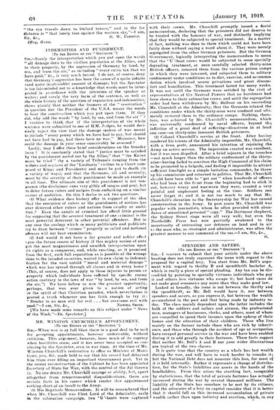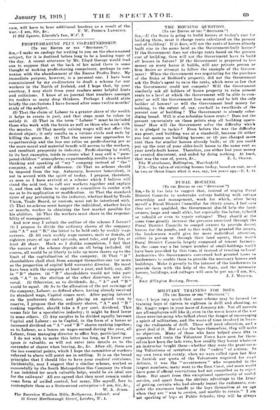SPENDERS AND SAVERS.
Fro sun EDITOR or THE " Sercreron."1
SI11,—I venture to submit that your article under the above beading does not truly represent the issue with regard to the proposal for a capital levy. You start from Mr. Bell's argu- ment with regard to thrifty B and spendthrift bachelor A, which is really a piece of special pleading. Any tax can be dis- credited by pointing to specially virtuous individuals who pay It and others lees virtuous who escape it; but hard eases do not make good economics any more than they make good law.
Looked at broadly, the issue is not between the thrifty and the spendthrift, as Mr. Bell would have it, nor between spenders and savers, as you express it, but between the wealth accumulated in the past and that being made by industry to- day. The class mainly dependent upon the latter includes the hulk of the soldiers and sailors and airmen, the professional men, managers of businesses, clerks, and others, most of whom are compelled to spend their incomes upon the upkeep of their homes and the education of their children. Those who live mainly on the former include those who are rich by inherit- ance, and those who through the accident of age or occupation have escaped personal service in the war and have been enabled during it to add greatly to their fortunes. These facts suggest that neither Mr. Bell's A and B nor your wider illustration, are typical of the two classes.
It is quite true that the country as a whole has lost wealth during the war, and will have to work harder to remake it; but the National Debt does not measure this loss, for most of it is held internally. Rather it represents a change of distribu- tion, for the State's liabilities are assets in the hands of the bondholders. From this arises the startling fact, recognizIsl by statisticians, that the total of private fortunes has actually increased tiering the war by several thousand millions. Tha liability of the State has somehow to be met by its citizens, and the advocates of a levy on capital consider that it is better that it should fall on this increased accumulation of private wealth rather than upon industry and exertion, which, in any
case, will have to bear additional burdens as a result of the



































 Previous page
Previous page